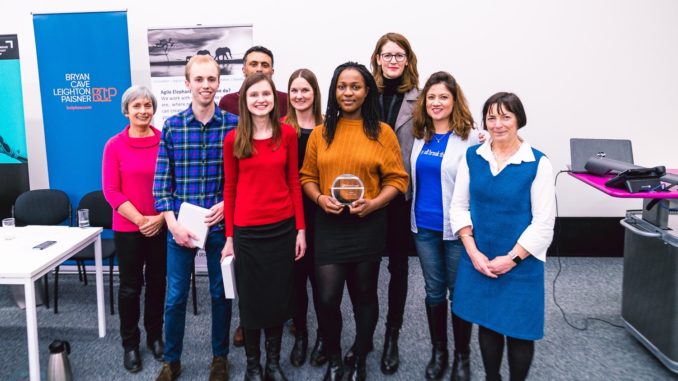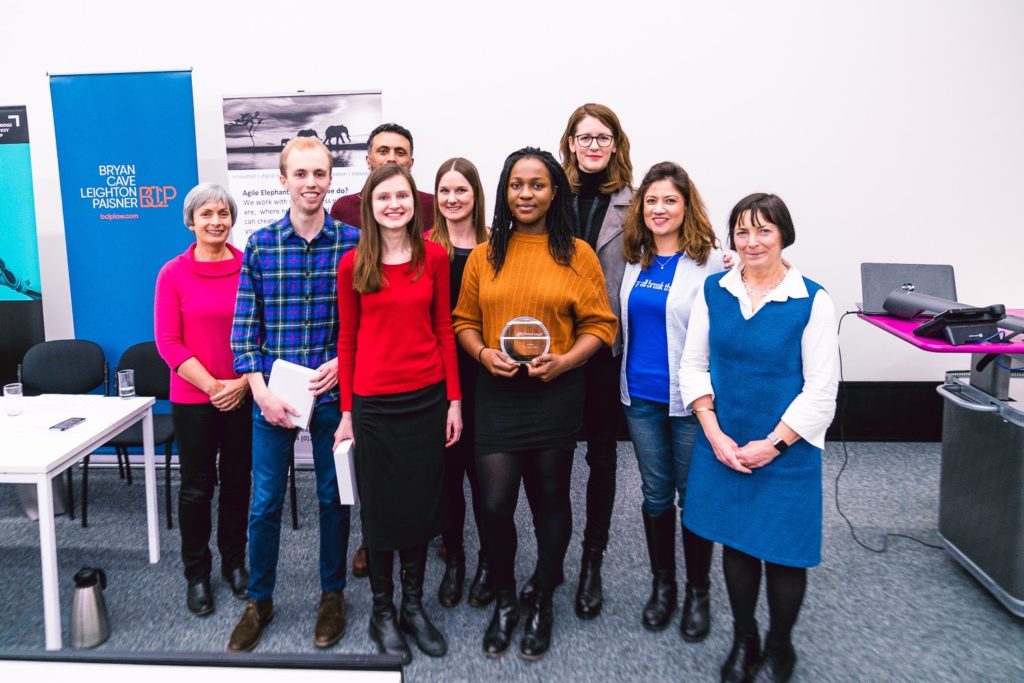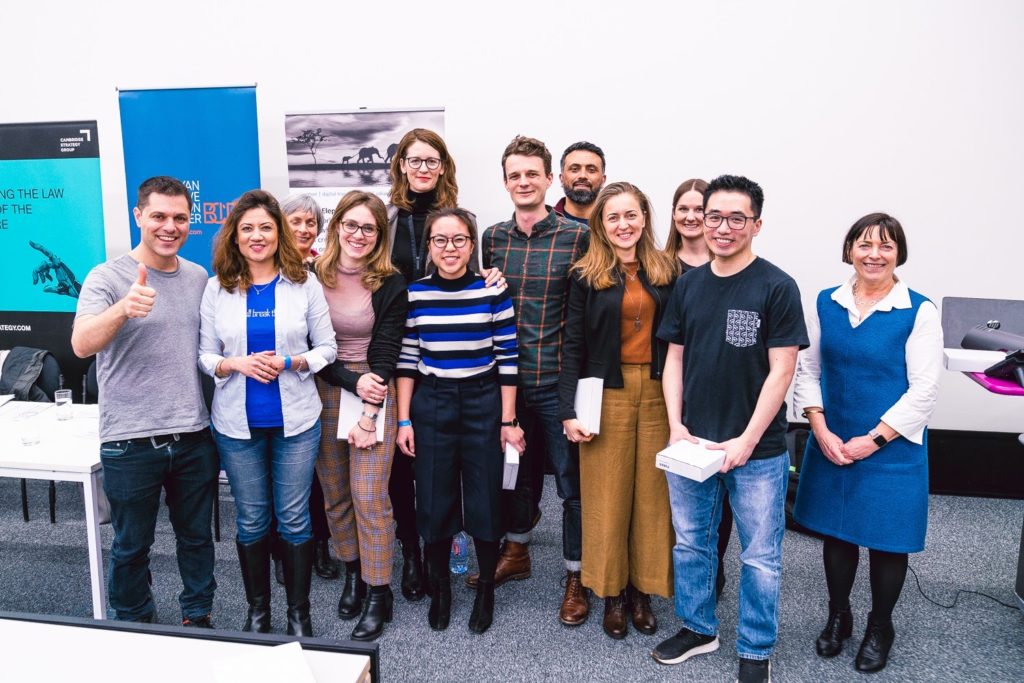
Here are the first wave of results for the Global Legal Hackathon (GLH), (see list below), showing the nodes around the world that have reported their winning teams so far. As you can see, cities from Canberra, Australia to Kampala, Uganda took part, and plenty of great ideas came to life during last weekend’s event.
Meanwhile, Artificial Lawyer can also give you a low down on what happened in the London node, with a special report from Robert Millard, of the Cambridge Strategy Group, who was a co-organiser of this local instance of the hackathon.
–
GLH London vs Covid-19 – Creativity Wins the Day
By Robert Millard
The Global Legal Hackathon (GLH) – London – went well, especially considering the dampening effects of Covid-19. We had roughly fifty people in total, which was about half as many as registered. Meanwhile, London-based Kearra Markowich, from the GLH management team, had arrived in Israel to visit the event there, but landed to hear announcements about quarantines and prohibitions on public gatherings, and so the event there was cancelled, and she didn’t even go through customs. In fact, she took the next flight out.
So, while it would have been nice to hit our target of 200-300 participants this year (and we hope to next year), under the current circumstances fifty would seem to be a perfectly respectable number.
What Went Down
Twelve ideas were pitched on Friday evening that coalesced into seven teams with very different, creative ideas focused on solving real issues. The solutions pitched to the judges on Sunday afternoon were:
- an app for solicitors to help their clients cut through the legal complexities of buying/selling a house (‘Homiie’ – the overall winner)
- a simplified, dis-intermediated process for obtaining letters of credit for global trade, using a blockchain core (‘Sharment’ – the first runner up)
- a tool to remove gender and other bias from the process of allocating work across legal teams (‘The Magic Box’ – winner of the inclusivity challenge)
- a platform to make it easy and inexpensive for SMEs to recover debts, so improving their cashflow (‘Cockroach Debt’ – second runner up)
- an app to help micro-scale entrepreneurs, especially those from disadvantaged backgrounds, identify legal bear traps in establishing their businesses (‘Wayfarer’)
- an app making it easier for customers to obtain reimbursement for cancelled/delayed trains across Europe + UK (‘Easy Rail Rights’)
- a platform to ‘gamify’ remote working and monitoring wellbeing in legal teams, to make such work more productive and engaging (’The Virtual Office’).
Given that all but one of the organised law firm entries withdrew in London because of the Covid-19 scare, the atmosphere was more informal and fluid this year than in 2019 or 2018.
One of the judges, on questioning the ‘Sharment’ team about how much pre-work they had done, discovered the answer to be ‘none at all’ because the team members did not even know each other prior to the hackathon.
(‘Pre-baked’ solutions as you know are contrary to the GLH rules and this team pitched a very sophisticated tool underpinned by a significant amount of coding over the weekend.)

‘The Virtual Office’ team consisted of two associates from Linklaters who pitched their idea hoping to attract people to work with them. The diverse group that resulted did a brilliant job producing a fresh, exciting view of what remote working might look like in the law firm of the future.
The team working on the rail delay compensation app were students (aged 21 and 22) from a range of universities including from France and Germany. They produced a perfectly viable proof of concept that made technical and business sense and that meets a clear need in society. Don’t be surprised if you see this app commercially available soon.

‘Cockroach Debt’ came up with a solution that I am sure they will also commercialise shortly, with a branding that is impossible to un-remember.
Once again, this weekend highlighted just how much productive ingenuity can be unleashed by working on a focused problem in a context that inspires people.
There is also much about the GLH more generally to inspire law firms and others in how they might better tackle innovation themselves, internally or collaboratively with clients and others.
Our panel of judges this year was truly stellar. They were:
- Mo Zain Ajaz (Global Head of Legal Operational Excellence National Grid)
- Elizabeth Duff (Dean of Westminster Law School)
- Priya Lele (Legal Operations Lead, Client Solutions, UK, US & EMEA, Herbert Smith Freehills)
- Rosemary Martin (GC, Vodafone)
- Jenifer Swallow (Director, LawTech Delivery Panel)
- Nicola Tulk (Programme Manager, Better Markets Nesta Challenges)
The Law Society of England & Wales and the Solicitors Regulation Authority both publicly endorsed and supported the GLH in London, showing the gravitas that the event has developed in the market.
The Marylebone campus of the University of Westminster was a superb venue in all respects and the staff of the university could not have been more supportive. Finally, as with last year and in 2018, this event would also not have seen the light of day without my brilliant co-conspirators, Fraser Matcham of Legal Utopia and David Terrar of Agile Elephant.
And of course, many thanks to David Fisher of Integra Ledger, who started the whole thing.
–
GLH Winners Announced So Far – From Australia to USA.
| Location | Team Name | Brief Description of Solution |
| Australia, Canberra | IDEal | Program to save lawyers time in drafting legal advice following initial consultations |
| Brazil, Aracaju | Nino | Utilizar o processamento de linguagem natural como uma forma de prever crimes envolvendo crianças em games online |
| Brazil, Balneário Camboriú | Data Certify | Decrease the cost of the lawsuit and expand access to justice through data validation using blockchain technology. |
| Brazil, Belo Horizonte, Minas Gerais | SARA | System for reception and solution of sexual harassment in work/organizations environment. It includes an exclusive external channel for incidents communication, a chatbot and legal, psychological and health experts advise both for victim and organization, and floow-up of the roll out of the incident. Also, it envolves a label of free harassment environment for compliant work places and organizations. |
| Brazil, Cuiabá | E-Concilia | E- Concilia is an online platform, which facilitates dialogue between users free of charge, to resolve their conflicts / problems, without the interference of third parties, in a safe, fast and efficient way. |
| Brazil, Curitiba | I SAW | Platform to adapt sites to GDPR. |
| Brazil, Florianópolis | 801 – Abraceme | Plataforma de conexão entre instituições de abrigo e pessoas que desejam apadrinhar crianças que não estejam na faixa etária mais procurada para adoção. |
| Brazil, Fortaleza | HEALTHLAW | Application for searching and describing medicines provided free of charge by the government, in order to educate users and show them the best procedure for obtaining medicines without the need for judicialization |
| Brazil, Manaus | Young Lawyer | Ofertar aos advogados iniciantes as demandas de trabalho dos advogados Sr. |
| Brazil, Porto Alegre | Ido | It is a digital platform that helps the elderly to enforce their rights by proposing journeys that solve their problems. |
| Brazil, Recife | Adote! | O Adote é uma solução que irá aproximar pessoas que querem adotar e as crianças que estão disponíveis para adoção. |
| Brazil, Rio de Janeiro | DemorôJur | the team developed a platform to track the time spent by lawyers in court hearings, something with a logic similar to that of the Waze app. for having a free and collaborative sharing, the model generates a lot of data. With these data, the team developed a business model focused on selling the credit of the lawsuits registered on the platform to venture capitalists, since when the lawyer goes to the hearing, the number of the judicial process is placed on the platform. Is good to say that all judicial data is public and available here in Brazil. |
| Brazil, Sao Paulo | Thesis | Our project submitted to the GLH consists of a digital platform for sharing legal knowledge (thesis marketplace). In it, any user will be able to add their own theses, choosing to share them for free or establishing a price for access. Another platform environment will allow users looking for answers to a specific legal problem to create Thesis Requisitions. |
| Canada, Toronto | Team AmI | Helping high-growth Enterprise SaaS companies navigate the data governance compliance process for sale into the US market. |
| Germany, Cologne | Skillerator | Platform to easiert employ people from foreign countries. Inform them about the legal process. |
| Hungary, Budapest | Food Fighters (Fooders) | The team’s idea is to create a software solution / website called Nutricheck to help food producing companies to be compliant with their food products’ advertising in EU countries, helps to be compliant with the EU regulations. Their solution gives advice on what expressions can be used on product labels, and in advertisements. Based on input, gives estimations on which terms should be used and which are not. Main target groups are legal offices, and also for example marketing/promotional professionals working at/for FMCG companies. |
| India, National Capital Region | BonaFight | BonaFight is a tech based solution for both consumers and lawyers. As a discovery platform it bridges the gap between consumers looking for legal assistance best suited for their specific needs like seniority, nature of the matter, skill sets, price points etc. For lawyers and firms, BonaFight’s automated enterprise platform provides multi layered solutions from in-house management to finances, clients, payments, file sharing and cloud services. As a holistic platform, its end to end tech bundle aims to make a significant advancement in the otherwise dormant legal tech space in India. |
| Kenya, Nairobi | Rubi the Mediator “MwenzanguTuwasiliane” |
Giving families neutral options to manage and resolve
their family wealth (inheritance) and disputes without the court system with Rubi-The-Mediator a simulation game that gives the local citizen a chance to learn mediation without a third party. The game has 4 level, each level has to end with the complainants agreeing. |
| Nigeria, Lagos | Case Board |
They are building a
cloud based unified and collaborative platform for lawyers and administrative
staff in a law firm to effectively manage their cases and activities. So stakeholders can view their cases any day , anytime and on any device. |
| Poland, Warsaw | Slotheye | SlothEye is a tool to monitor IT process in terms of compliance – it’s integrated with popular agile project management tools (e.g. Jira). The solution, based on data from these programs and repositories, automatically analyzes the project for compliance with IP and NDA requirements, including helping to manage licenses for the source code. |
| Romania, Bucharest | Legal Surfers | Cookies consent manager easy to understand |
| Romania, Iasi | IDENTIVE | platform to protect intelectual property rights for designers |
| South Africa, Johannesburg | Just Like That – A Lawyer In Your Hands | This tackles the problem of widespread misunderstanding around common law rights and obligations when entering into contracts, and the challenges for consumers when enforcing verbal contracts with service providers – a problem widely recognised in many areas of South Africa. Just Like That is a WhatsApp chatbot which creates a plain language, multilingual contract between parties based on instant messaging conversations. It is aimed at young entrepreneurs and sole proprietors, as well as consumers engaging service providers. |
| Spain, Madrid | RJ Tech | Iqualex |
| Spain Madrid | Tech-no-thon | Legal Crowd – crowdfunding litigation |
| Uganda, Kampala | Nkola App | USSD Messaging App that provides quick answers on labour laws and provides employers with tools that enable them to resolve their employment/labour issues quickly and in healthy ways. |
| United Kingdom, London | Homiie | Homiie is a platform that makes the complicated business of buying and selling a house faster, more collaborative and more transparent. |
| United Kingdom, Manchester | SHED | Student Housing rights & agreements |
| United States, Los Angeles | Co-Counsel | Better access to the law through a user-centric experience for those who can’t afford a lawyer. |
| United States, Portland | Team BOSS | Our technology helps level the playing field of direct democracy by making it easier and more cost-effective to run petition campaigns. |
| United States, Salt Lake City | Post in Peace | Chrome extension that flags copyright issues on social media posts. |
| United States, St Louis | IdeaFlight | We created IdeaFlight to help fill the gap in capital venture investment opportunities. IdeaFlight is a way for those from underrepresented groups to gain access to the legal and business knowledge necessary to pitch an idea to an investor. |
| United States, University Park | Penn State Law | The team is working to create a document analysis system takes complex legal documents and distills the document down to what is different and what is important in the document. The product, VAR, is marketed to individuals and small business owners who may have agreements with vendors, companies, or employers and have a potential claim or legal issue, but do not understand the legalese in their documents. The team is particularly interested in assisting users who may have forced arbitration clauses navigate the arbitration process, as well as connect them with third party payers who are willing to help fund the arbitration or litigation of their case. Finally, the solution will crowdsource content from other users of the platform (confidentially and with notice to users) to help the user determine if their situation is common and, if so, the likelihood of success of their case. VAR aims to (1) help employees and small businesses understand the terms of their contracts, track changes whenever there is a new contract and learn about how the legal changes affect their business; (2) introduce them to third-party funding that can help them pay the overhead costs of arbitration or litigation; and (3) provide a third-party and anonymous reporting mechanism where employees can file grievances and receive a report that indicates whether individuals in the same company have filed similar grievances. VAR is one product, working on behalf of everyday employees and small, local businesses who do not have access to legal resources. Ultimately, the team hopes to close an access to justice gap where individuals and small businesses, particularly those who are women and minority owned, who may not have the legal knowledge to understand and successfully arbitrate or litigate their legal claims will be able to easily and inexpensively (plans start at $30) review an agreement and equip them with the knowledge to arbitrate or litigate their claim. |
(More results are still coming in.)
– a tool to remove gender and other bias from the process of allocating work across legal teams (‘The Magic Box’ – winner of the inclusivity challenge)
I think this is the most innovative and practical thing for law firms. Bravo!